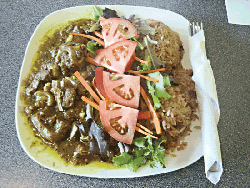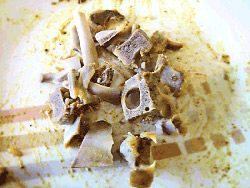From the Bollard.com
January 4, 2009
Off the Eatin' Path
By Zachary Barowitz
 |
The Curried Goat Platter at Federal Spice. photos/Zachary Barowitz |
I’ve tried to forget the time I ordered a curried goat roti (wrap) from a Jamaican street vendor.
It was my first job and my first time eating goat. I’d discussed the prospect the day before with Dexter, a co-worker from Jamaica, but was nevertheless unprepared for what I got. Although it looked like a burrito, it felt like a warm, lumpy, guinea pig-sized waterbed. Handling was difficult, and it was not long before some leaked out and stained my shirt (I later resolved this by dyeing the entire shirt with turmeric). As the wrapper fell apart, I was left to scrape up the large balance of stew-meat, gravy, and soggy flatbread with my fingers.
But the biggest shock, as I reported to Dexter, was the bones. Because the meat is cut on a band saw or with a cleaver, goat bones, besides being very plentiful, also have an irregular shape, with multiple sharp edges and points. “Yes,” Dexter conceded. “When you are eating goat, you are mostly eating bone.”
The lesson learned: when ordering goat, I prefer to be able to see what I’m eating.
The Curried Goat Platter at Federal Spice in downtown Portland is a pile of braised goat chunks served beside a pile of rice and peas — called arroz con gandules in Latin cuisine, this is rice cooked with pigeon peas, a starchy brown legume — topped with a salad that’s better described as a garnish of frilly lettuce leaves and tomato slices.
Never mind the salad — the curried goat at Federal Spice is the real deal.
Because the meat comes from various parts of the animal (mostly the legs), it varies with each bite: some bites are lean, some fatty, some with a rind of skin cooked delectably soft. But the succulent meat in its yellowish-brown gravy falling off the viciously square-cut bones is only half the pleasure. The leisurely determination with which one sets to the task of gnawing off the bolshie bits of meat and sucking the marrow out of the bones produces an indulgent delight.
 |
Goat bones from Federal Spice |
Eric Martin, a native of Jamaica and long-time resident of Maine, bought Federal Spice about a year ago and has added a Jamaican menu to the shop’s menu of wraps. In addition to goat, it includes oxtail, jerk chicken, escovitch, and Jamaican pastries, as well as the incongruously double starch — but addictive — patties and coco-bread (a meat patty served in a soft white roll).
The décor hasn’t changed much. The shop’s most remarkable feature is still its high ceiling. A tune that sounded like a Muzak version of Bob Marley’s “Could You Be Loved” added a little island atmosphere during my visit.
Federal Spice offers daily specials, and will be expanding the dinner menu in the coming months.
• • •
Goat is the most eaten meat in the world. It became popular in the West Indies through its use as a lamb-substitute by indentured servants imported to the Caribbean from India during the 19th century. Indeed, West Indian cuisine owes various debts of influence to this Indian presence. For example, West Indian curry powder differs only slightly from the original (in that it includes star anise and allspice), and roti is originally a Hindi word for flat bread.
But Indian emigration was not confined to the British West Indies. Somali cuisine manifests a distinct south-Asian influence with signature items like chapathi (a pan-fried bread) and sambusa, which any casual observer would liken to an Indian samosa. Somali cuisine also bears traces of Italian cooking, a result of Mussolini’s ill-fated foray into East Africa.
 |
The band saw at Hamdi. |
Hamdi is a Somali restaurant and market on Washington Avenue, part of the burgeoning strip of ethnic markets and eateries on the peninsular stretch of the avenue. Gastronomically, the goat plate at Hamdi is remarkably similar to the one served at Federal Spice: a big plate of flavorful meat falling off the bones, and a mound of tasty yellow rice.
Although Somalis typically curry their goat, Hamdi does not, so as to broaden the dish’s appeal to customers from other African nations. Curry may be added by request.
The other menu offering the day I visited, a few very ordinary pieces of roasted chicken, was not exciting. The spaghetti side dish — a prime example of Italo-Somali cuisine — with its mushy noodles and bland sauce was uncomfortably close to Franco-American®. We enjoyed Somali tea (similar to Indian chai) and Somali coffee (“Not as strong as regular coffee,” explained the cook, though it seemed about normal to me, and was pleasantly spiced, having been brewed with powdered ginger).
Both Federal Spice and Hamdi serve authentic cuisine, but the location of the former gives it access to the downtown lunchtime trade, while Hamdi (like Al-Amin Halaal Market, on St. John Street) mainly caters to new immigrants. The distinction between these two clienteles influences the degree of informality with which each establishment presents itself. For example, Federal Spice takes pains to style the dish; Hamdi simply plonks it on a plate. Indeed, Hamdi makes little effort to smooth any rough edges in food, décor, or service. Our waiter was perfectly polite but visibly nervous. When we ordered water, he brought it promptly and handed us each a banana (a traditional compliment in Somali cuisine), but the bill took an exorbitant amount of time to calculate, even though the tax seemed to be included in the meal’s price.
Hamdi doubles as a store carrying basic African groceries, clothing, incense burners and the like. And it does triple-duty as a meat market that primary consists of a freezer, bloodstained cloths, and a band saw.
“This is just like Africa,” my friend exclaimed, referring not only to the smudgy flatware, windows, and tablecloths, but also to the general ethos at play: women in traditional dress worked in the kitchen while men in Western clothing sat around, apparently transfixed by a reality cop show on the too-loud TV. “Somali men cannot cook,” explained the chef. “But they are learning.”
— Zachary Barowitz
Federal Spice
225 Federal St., Portland
774.6404
Open Mon.-Fri. 7 a.m.–8 p.m., Sat. 11 a.m.–8 p.m.
Hamdi
30 Washington Ave., Portland
615.0022
Open 9 a.m.–9 p.m. daily